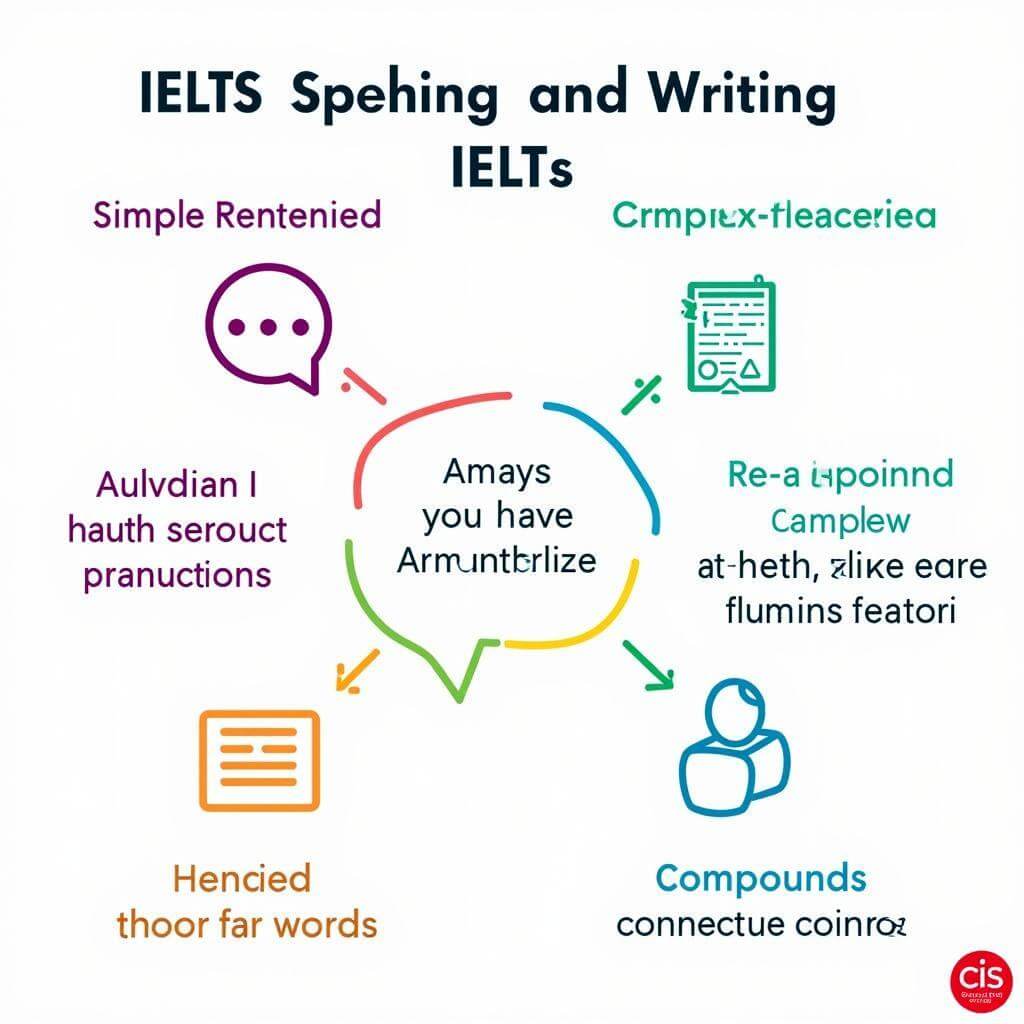Enhancing your fluency in English is crucial for success in the IELTS exam, particularly in the Speaking and Writing sections. One effective way to achieve this is by IELTS Speaking natural fluency tips? incorporating varied sentence structures into your language use. This article will explore practical strategies to improve your fluency and diversify your sentence constructions, helping you to express yourself more effectively and score higher on the IELTS test.
Understanding the Importance of Sentence Variety
Varied sentence structures are essential for several reasons:
- They demonstrate a higher level of language proficiency
- They make your speech and writing more engaging
- They allow for more nuanced expression of ideas
- They help maintain the examiner’s interest
By mastering different sentence types, you’ll be better equipped to handle the diverse tasks in both the Speaking and Writing modules of IELTS.
Types of Sentence Structures to Master
Simple Sentences
Simple sentences contain one independent clause. While they’re straightforward, they can be powerful when used strategically:
- “The economy is growing rapidly.”
- “Environmental issues are a global concern.”
Compound Sentences
Compound sentences combine two independent clauses using coordinating conjunctions (FANBOYS: for, and, nor, but, or, yet, so):
- “The city has excellent public transportation, but traffic congestion remains a problem.”
- “Education is important for personal growth, and it contributes to societal development.”
Complex Sentences
Complex sentences include one independent clause and at least one dependent clause:
- “Although technology has improved our lives, it has also created new challenges.”
- “When considering career options, it’s essential to balance personal interests with job market demands.”
Compound-Complex Sentences
These sentences combine elements of both compound and complex sentences:
- “While some people prefer urban living, others enjoy rural areas, but both lifestyles have their advantages and disadvantages.”
- “If we don’t address climate change soon, global temperatures will continue to rise, and ecosystems will be irreversibly damaged.”
 Improving fluency with varied sentence structures in IELTS
Improving fluency with varied sentence structures in IELTS
Strategies for Incorporating Varied Sentence Structures
1. Practice Sentence Combining
Take simple sentences and combine them using different conjunctions and subordinating words. For example:
- Simple: “The weather was cold. We decided to stay indoors.”
- Combined: “Because the weather was cold, we decided to stay indoors.”
2. Use a Variety of Transition Words
Transition words can help you connect ideas and vary your sentence beginnings:
- “Furthermore, the study revealed surprising results.”
- “In contrast, the opposing viewpoint suggests a different approach.”
- “Consequently, new policies were implemented.”
3. Experiment with Sentence Openers
Start your sentences with different elements to add variety:
- Prepositional phrase: “In the midst of the debate, a new perspective emerged.”
- Participial phrase: “Having considered all options, the committee made its decision.”
- Adverb: “Interestingly, the research contradicted previous findings.”
4. Incorporate Appositives
Appositives can add information to your sentences without creating a new clause:
- “Paris, the City of Light, attracts millions of tourists annually.”
- “The new environmental policy, a controversial measure, aims to reduce carbon emissions.”
5. Utilize Relative Clauses
Relative clauses can help you provide additional information about a noun:
- “The book, which won several awards, explores themes of identity and belonging.”
- “People who exercise regularly tend to have better overall health.”
Applying Varied Structures in IELTS Tasks
Speaking Tasks
In the IELTS Speaking test, using varied sentence structures can significantly enhance your fluency score. Here’s how to apply this skill:
-
Prepare complex responses: When answering questions, don’t limit yourself to simple sentences. Be open to + noun/gerund expressing your ideas in more elaborate ways.
-
Use linking words: Connect your ideas smoothly with transitions like “however,” “on the other hand,” and “in addition.”
-
Incorporate idiomatic expressions: These can add sophistication to your speech. For example, “It’s raining cats and dogs” instead of “It’s raining heavily.”
-
Practice storytelling: When asked to describe an experience, use a mix of sentence types to make your narrative more engaging.
Dr. Sarah Thompson, a renowned IELTS Speaking examiner, advises: “Candidates who effortlessly blend different sentence structures often score higher in fluency and coherence. It’s not just about speaking quickly; it’s about expressing ideas clearly and naturally.”
Writing Tasks
For IELTS Writing tasks, varied sentence structures are equally important:
-
Essay introduction: Start with a complex sentence to introduce your topic, followed by simpler sentences to state your position.
-
Body paragraphs: Use a mix of sentence types to present and explain your main points. This helps to maintain the reader’s interest.
-
Conclusions: Summarize your arguments using compound-complex sentences to show the relationships between your ideas.
-
Task 1 reports: When describing data or processes, alternate between simple statements and more complex explanations.
Common Pitfalls to Avoid
While striving for variety, be cautious of these common mistakes:
-
Overcomplicating: Don’t make every sentence complex. Simple sentences can be powerful too.
-
Losing clarity: Ensure that your meaning remains clear, even in longer sentences.
-
Forcing variety: Let the variety come naturally as you express your ideas.
-
Neglecting coherence: Make sure your sentences flow logically from one to the next.
-
Ignoring punctuation: Proper punctuation is crucial for complex sentences to be understood correctly.
Exercises to Improve Sentence Variety
-
Sentence transformation: Take a paragraph from an English newspaper and rewrite it using different sentence structures.
-
Daily journaling: Write about your day using at least three different sentence types.
-
Speaking practice: Record yourself answering IELTS-style questions, then analyze your sentence variety.
-
Reading analysis: Be conducive to + noun by studying well-written articles and identifying different sentence structures.
-
Peer review: Exchange writing samples with a study partner and provide feedback on sentence variety.
Professor Michael Chen, an expert in English language acquisition, states: “Regular practice in manipulating sentence structures is key. It’s like learning a new instrument – the more you practice, the more natural and fluent your performance becomes.”
Conclusion
Improving fluency with varied sentence structures is a powerful strategy For the sake of + noun enhancing your IELTS performance. By mastering different sentence types and applying them judiciously in your speaking and writing, you’ll demonstrate a higher level of language proficiency and express your ideas more effectively. Remember, the goal is not just to use complex structures, but to communicate clearly and naturally. With consistent practice and attention to these techniques, you’ll be well on your way to achieving your desired IELTS score.
FAQs
-
How many different sentence structures should I use in my IELTS essay?
There’s no fixed number, but aim for a natural mix. A good rule of thumb is to include at least one of each type (simple, compound, complex, and compound-complex) in each paragraph. -
Can using too many complex sentences negatively affect my IELTS score?
Yes, if it impacts clarity or seems unnatural. Balance is key. Use complex structures where they enhance your expression, not just to show off. -
How can I practice varied sentence structures in everyday life?
Try consciously using different structures in conversations, emails, or social media posts. Reading widely and analyzing sentence structures in well-written texts can also help. -
Are there any specific sentence structures that IELTS examiners look for?
Examiners don’t look for specific structures, but they do assess your ability to use a range of structures accurately and appropriately. Focus on clarity and natural expression rather than trying to use particular structures. -
How do I know if I’m using sentence structures correctly in my writing?
Practice with online grammar checkers, ask for feedback from English teachers or native speakers, and study example sentences in reputable English learning resources. Strategies for better grammar usage can also help you improve your accuracy.


